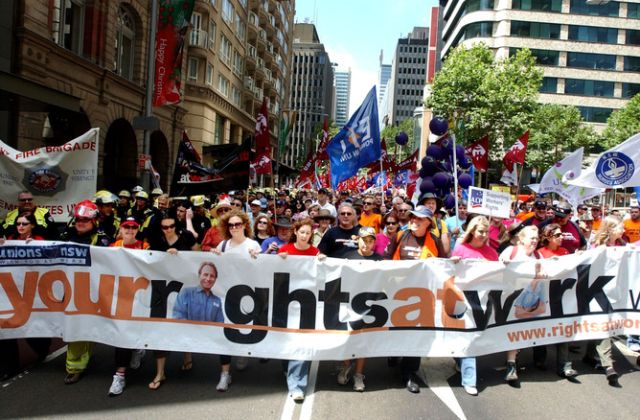
One of the pre-election promises of Tony Abbott’s government was to initiate an inquiry into workplace relations by the Productivity Commission.
But the spectre of former prime minister John Howard’s WorkChoices, which lost the Coalition the 2007 election and the PM his seat, meant there was no great rush.
The plan was to pave the way for an assault on wages and working conditions by first attacking unions through a Royal Commission specially set-up for the purpose.
This did provide sensationalist headlines repeating untested assertions, but its publicly perceived reach never went much beyond the usual suspects of right-wing ideologues.
What voters thought of it and other attacks on living standards was wrapped up in an early Christmas present for the Coalition. In December the opinion polls, Ipsos, Galaxy and Newspoll, all had Labor leading the Coalition by 4%, 10% and 8% respectively.
This is why the new year for the Coalition began with a “re-think” of unpopular policies. Its collective, sober reflection over the holiday period has apparently concluded that it wasn’t the policies themselves that were the problem — it was just that they hadn’t been “sold” well enough.
But as the new sales drive was met with ridicule and contempt, and talk turned to removing Abbott from the leadership, the Productivity Commission inquiry was pulled out of the policy bag.
Productivity Commission chairperson Peter Harris tried to distinguish his inquiry from WorkChoices by claiming that it would compile hard evidence and data setting out the economic impact of conditions such as the minimum wage.
Perhaps he’s not aware that the minimum wage was first established in 1907, so there is a fair bit of evidence around as to its economic impact.
The wording of his briefs on the five items for consideration, which also cover penalty rates, unfair dismissals, enterprise bargaining provisions and the Fair Work Commission itself, tells against any objective analysis.
The first item under penalty rates is “deregulation” which is a broad enough hint as to where the inquiry will go.
Employer representatives and Abbott government ministers see the virtue of the inquiry as identifying impediments to jobs growth.
What this can only lead to is either a watering down of present minimum rates and conditions or their complete abolition in the name of creating jobs.
The idea that cutting the minimum wage and penalty rates will create jobs is a myth born of voodoo economics in the US, where the evidence is that higher minimum wages actually raise employment.
The only result of a lower minimum wage would be to cut employment opportunities and increase the number of working poor. It is nevertheless regularly rolled out as a favoured policy prescription by conservatives trapped in a time-warp of hatred for unions and the workers they represent.
In the two years preceding the 2007 federal election, the ACTU ran a campaign against WorkChoices. According to reported Electoral Commission figures, it came at a cost of more than $60 million in direct and indirect support. It included the Your Rights at Work campaign, which connected the union movement with the broader community in opposition to unfair work laws.
An analysis of the Australian Electoral Study conducted after the 2007 poll showed just how successful the campaign was — industrial relations and climate change were the biggest vote-changing issues that returned Labor to government.
The union campaign was based on the human rights principles of freedom of association, the right to organise, and the right to strike that form the basis of the International Labour Organisation (ILO) conventions that were breached by WorkChoices.
For all their efforts in getting Labor elected, what the unions got in place of Work Choices was the equally disingenuous Fair Work Act, which squandered the opportunity of fairer works laws in favour of employers’ rights.
About half of the members of the Labor government responsible for this legislative sleight of hand came from the union movement.
The Productivity Commission will produce its report in November this year, and the Abbott government has said that any recommendation it makes that is supported by the Coalition would be taken to the 2016 election.
This is another tribute to how spooked the Coalition still is at the success of the campaign against WorkChoices.
The Productivity Commission hearing is a set-up to slash wages and conditions, whose search for a rationale was over before the inquiry was announced.
Labor can expose this farce and re-frame the terms of the public debate by declaring the details of an industrial relations policy that would free unions from legislative constraints so they can properly represent their members’ interests.
But they will have to have a word with shadow assistant treasurer Andrew Leigh, sitting member for the seat of Fraser in the ACT, and former professor of economics at the Australian National University.
He is cited by the Productivity Commission as having advanced the proposition that higher minimum wages might raise inequality by reducing employment in low income households.
Perhaps he also believes that if the minimum wage is reduced by half, low income households will be twice as well off.
Like the article? Subscribe to Green Left now! You can also like us on Facebook and follow us on Twitter.